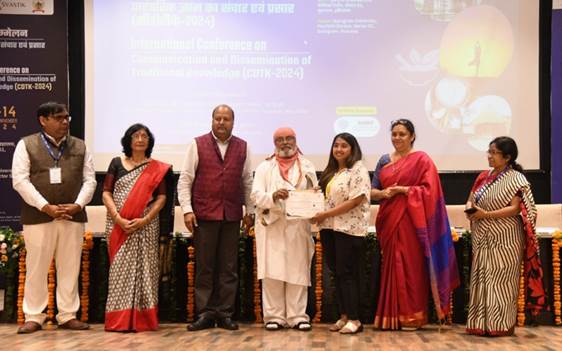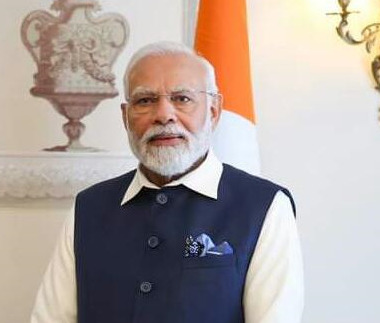New Delhi, Delhi,17th of November, 2024 : CSIR-National Institute of Science Communication and Policy Research (NIScPR) and Gurugram University jointly hosted the International Conference on Communication and Dissemination of Traditional Knowledge (CDTK-2024) at Gurugram University, Gurugram on 13-14 November 2024.

The conference’s first day featured diverse sessions, including discussions on integrating traditional pedagogies into modern education, ethics in traditional knowledge research, and the science behind traditional agriculture and cuisine. Additional sessions explored sustainable traditional architecture, integrating ancient sciences into modern disciplines, and effective communication of traditional knowledge through the “Paramparik Gyan Sanchar: SVASTIK workshop.
Following a successful inaugural day at CDTK 2024, the second day has featured remaining compelling sessions that delve deep into the realms of traditional knowledge research and communication. The Arogya Vidya session was chaired Prof. Bhushan Patwardhan, National Research Professor-AYUSH, SBPPU, Pune, who urged healthcare professionals to prioritize patient welfare above personal egos and adopt the best practices for humanity’s benefit. Dr. Rabinarayan Acharya DG, CCRAS, New Delhi, stressed the need for an inclusive, evidence-based healthcare framework. He discussed integrating AYUSH systems and cross-referrals in tertiary healthcare. Dr. N. Zaheer Ahmed, DG, CCRUM, New Delhi, highlighted the importance of research in drug quality and traditional remedies.
Dr. N. J. Muthukumar DG, CCRS, Chennai, emphasised the revival of Siddha practices, and CCRS introduced digital tools to enhance healthcare communication. The session on “Jal, Paristhitiki Evam Paryavaran” was chaired by Dr. Virendra M. Tiwari, Director, CSIR-NEIST and featured Prof. Saroj K. Barik, Professor, NEHU Shillong, who discussed Traditional Ecological Knowledge and its applications in biodiversity, forest conservation, and sustainable practices using examples from Northeast India. He emphasised sustainable bamboo management by referencing “Asha Van” and the significance of sacred groves.
Prof. Sharad Jain, Former Director, National Institute of Hydrology, Roorkee, explored ancient India’s advancements in hydrology, tracing knowledge to the Indus Valley Civilization and referencing texts like the Rig Veda and Arthashastra. He highlighted historical water management structures and techniques, showcasing India’s rich hydrologic heritage and its connection to civilisation and sustainability. The session on “Reviving Ancient Healing Traditions and Integration into Modern Healthcare: Yoga, Homeopathy & Sowa Rigpa” was chaired by Dr. A. Raghu, Deputy Director General of Health Services at the Ministry of Health and Family Welfare, with Dr. Yogita Munjal, Director, Directorate of AYUSH, as co-chair.
Dr. A. Raghu addressed the efforts of the Indian government in disseminating traditional knowledge across various sectors, highlighting the commitment to share this wisdom with the international community. Dr. Sunil S. Ramteke, Deputy Director General, CCRH, New Delhi, discussed the operational principles of homeopathy, illustrating them with examples of various plants and their medicinal benefits. Dr. I N Acharya, from the Morarji Desai National Institute of Yoga in New Delhi, emphasised the therapeutic effects of pranayama in managing contemporary stress.
Furthermore, Dr. Padma Gurmet, Director of the National Institute of Sowa Rigpa in Leh, underscored the importance of Sowa Rigpa in the Himalayan region, particularly its ties to Indian Buddhism. Prof Vibha Tripathi, Former Head & Emeritus Professor, BHU, Varanasi opened the panel discussion on Scientific Validation of Traditional Knowledge: Challenges and the Way Forward. The panellist, Prof (Dr) Rama Jayasundar, Prof & Head, NMR Division, AIIMS, New Delhi highlighted 3 major objectives of research that are validation for providing the evidence(s), use of information from traditional knowledge in modern science like drug discovery, and research to improve healthcare system. Dr Rabindra N Padariya, Joint Director (Extension), IARI, New Delhi highlighted the authentication of traditional agricultural knowledge that requires interdisciplinary collaboration, community-based validation, digitalisation, scientific incentives, NGO partnerships and University-level research. About 400 delegates engaged in both poster and oral presentations, demonstrating their research efforts.
Prof. Ranjana Aggarwal, Director, CSIR-NIScPR opened the valedictory session by warmly welcoming everyone and expressing gratitude for their contribution to the success of the event. She extended a special welcome to the chief guest, Anil Joshi, who graciously attended at short notice.
Prof. Dinesh Kumar, Vice Chancellor, Gurugram University offered his congratulations to the entire team for their collective efforts in making the conference a success. He highlighted the urgency of sustainability, expressing concern that material possessions cannot shield us from environmental degradation unless we commit to sustainable practices.

The Chief Guest of the session Padma Bhushan Prof Anil P. Joshi, HESCO, Dehradun addressed the audience, stressing the importance of remembering and preserving Indian traditions. He urged attendees to be mindful of their cultural heritage while navigating the influences of the western world. Prof Vibha Tripathi emphasised on harmonising traditional knowledge with contemporary science for a better future.
Dr. Charu Lata summarised the deliberations of the conference. Dr. Dhirender Kaushik, Professor at Gurugram University, expressed his heartfelt thanks to all the dignitaries and delegates for their invaluable contributions to the conference. He emphasised the collaborative efforts that led to the event’s success and encouraged continued engagement in future initiatives. This valedictory session reflected the conference’s achievements and reinforced the importance of sustainability and tradition in India.










More Stories
“Veer Bal Diwas Is A Living Stream Of Inspiration”: Sarbananda Sonowal.
PM Reviews Eight Key Projects Worth More Than Rs. 1 Lakh Crore.
Union Home Minister And Minister Of Cooperation Shri Amit Shah Chairs A Review Meeting Of BBSSL In New Delhi.